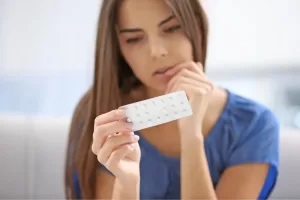10 questions women often ask about the mini pill
What is the mini pill and what is it used for?
- The mini pill (also known as the progesterone only pill or POP for short) is used as a method of contraception (birth control).
- It’s frequently chosen when the combined oral contraceptive pill (COCP) is unsuitable for some reason, due to side effects or a contraindication.
- The mini pill is often used as a form of contraception for women who are breast-feeding (the COCP is not suitable in this situation as it can reduce the flow of milk).
- Some women may opt for the mini pill as it is less likely to cause blood clots than the COCP.
So, how does the mini pill work?
- It thickens the mucus in the cervix, which makes it more difficult for sperm to enter the uterus (womb)
- It affects the wall of the womb, making it less likely to allow a fertilised egg to attach
- The minipill can cause women to ovulate less often (though this effect varies from woman to woman)
How effective is the mini pill?
- If used perfectly the mini pill is more than 99% effective.
- However, if it’s not used exactly according to instructions (and many women fall into this category!), about 9% of users may become pregnant within a year.
Who shouldn’t take the mini pill?
The mini pill is very safe for most women but is contraindicated if any of the following issues apply:
- Unexplained/irregular vaginal bleeding
- Pregnancy, or if you suspect you may be pregnant
- Breast cancer- current OR in the past
- A breast lump that has not been assessed & diagnosed
- Liver tumours or any severe liver disease
- Heart disease or strokes
- Migraine with aura that first occurred whilst taking the mini pill
- History of molar pregnancy
- Allergy to any of the ingredients contained in the mini pill
Some other conditions may mean the mini pill is not suitable- if any of the following issues apply, it’s best to see a doctor prior to considering the mini pill:
- Risk factors for cardiovascular disease (such as older age, obesity, high cholesterol, smoking, diabetes and high blood pressure)
- Vascular (blood vessel) disease, heart disease, atrial fibrillation (AF), stroke or mini-stroke (TIA)
- Blood clots in the blood vessels, legs or lungs- now or in the past
- Any condition (or a family history of a condition), which increases your risk of blood clots
- Lupus (SLE) or rheumatoid arthritis
- History of organ transplant
- Recent major surgery with prolonged immobility (bed-bound, wheelchair bound)
- Migraine
- Carrier of a breast cancer gene such as the BRCA1 or BRCA2 mutation
- Gallbladder disease
- Cholestasis/jaundice caused by the combined oral contraceptive pill
- HIV drug treatment
- History of ectopic pregnancy or abnormal fallopian tubes
- conditions causing malabsorption (i.e. the gut does not absorb food & medicines properly), such as coeliac disease or ulcerative colitis.
What are the risks and side effects of taking the mini pill?
The mini pill can cause side-effects, but significant side effects are very uncommon. For most women who require contraception, the benefits of taking it outweigh the risks. Possible side effects include:
- Irregular vaginal bleeding
- Changes in vaginal discharge
- Breast tenderness or enlargement
- Increased or decreased sex drive
- Acne, other skin rashes, chloasma (pigmentation of the face)
- Unwanted hair growth
- Mood changes /depression
- Nausea or vomiting
- Ovarian cysts
- Weight gain (uncommon)
- Headaches/ migraine/dizziness
- Possible small increased risk of breast, liver or cervical cancers
- Fluid retention
- High blood pressure
- Gallbladder disease
- Changes in cholesterol/lipids
- If pregnancy occurs while taking the mini pill there is a higher risk of ectopic pregnancy (a potentially serious condition in which the pregnancy implants outside the uterus)
Do you take the mini pill every day?
- Yes, the mini pill must be taken within the same 3 hour period each day.
- If you are more than 3 hours late taking your pill, you may become pregnant.
What if you miss a pill, or if you have vomiting or diarrhoea?
- If even one tablet is late (more than 3 hours later than the timing of yesterday’s dose), or if a tablet is entirely missed, you may become pregnant.
- The next pill should be taken as soon as remembered (even if that means taking two at once), then continue to take one each day, but also use condoms for the next 7 days.
- If you’ve had sex in the 7 days leading up to the missed/late pill, you may become pregnant- the morning after pill/ emergency contraception may be required. It is advisable to speak to your pharmacist or doctor
- The more doses that have been missed, the higher the chance of pregnancy.
- If you vomit within 4 hours or have severe diarrhoea after taking a tablet, it may not have been completely absorbed. This is like missing a dose- see above
What does it mean if you miss periods or get irregular bleeding on the mini pill?
- Some women don’t get periods when they take the mini pill. If you have missed a period, but you have taken all your tablets correctly and have not taken any medications that interfere with your mini pill, then it is very unlikely that you are pregnant- continue to take the mini pill as usual. If you have further concerns consult your doctor or pharmacist.
- If you miss two periods in a row, you may be pregnant even if you have taken your pill correctly – do a pregnancy test, and/or seek advice from your doctor.
- Irregular vaginal bleeding (spotting or breakthrough bleeding) between periods is common in the first few months of taking the mini pill. It’s usually advised to continue to take your tablets as usual. The bleeding often stops after a few months, once your body has adjusted to the
- If you have unexpected bleeding which is repeated, continuous, heavy or not settling after the first 2-3 months, you should see your doctor. If there is abdominal pain or abnormal vaginal discharge with the bleeding, you should also seek prompt medical attention.
Can you take the mini pill when you’re breastfeeding?
- Yes, the mini pill is safe during breastfeeding
Can other medications affect the mini pill?
- If you take any other medication you need to be certain that it doesn’t interact with your pill. If you are in any doubt you should speak to a pharmacist or doctor.
- Some that may pose a problem include:
- Epilepsy medications
- HIV medications
- St John’s Wort
Summary of important points about the mini pill
- No contraceptive option is 100% effective, though taken correctly the mini pill (POP) is extremely reliable
- Vomiting or diarrhoea when taking the pill, or a missed pill, can lead to pregnancy
- The mini pill does NOT protect against sexually transmitted infections
- If you take your mini pill more than 3 hours later than yesterday’s dose, you may become pregnant
- There are no inactive “sugar” pills in a mini pill pack- you take an active pill EVERY day, with no breaks
- Irregular vaginal bleeding is a common side effect of the POP, but you should have it checked out by your doctor to rule out other causes
If you have further questions about contraception or the mini pill, speak to your doctor.
Getting a Mental Health Care Plan in Australia: Your Guide
Getting a Mental Health Care Plan in Australia: Your Guide Mental health matters—and if you’re feeling overwhelmed, anxious, or down, a mental health care plan can help. But what is it, and how do [...]
UTI Symptoms and Treatment: What You Need to Know
UTI Symptoms and Treatment: What You Need to Know Urinary Tract Infections (UTIs) are common, uncomfortable, and often disruptive. But what exactly are the signs to watch for, and how can you get relief [...]
Free Mental Health Care Plan Online | Bulk-Billed by Qoctor
Free Mental Health Care Plan Online | Bulk-Billed by Qoctor Discover how to get a free, bulk-billed Mental Health Care Plan (MHCP) in Australia through Qoctor's telehealth service. Accessing [...]






